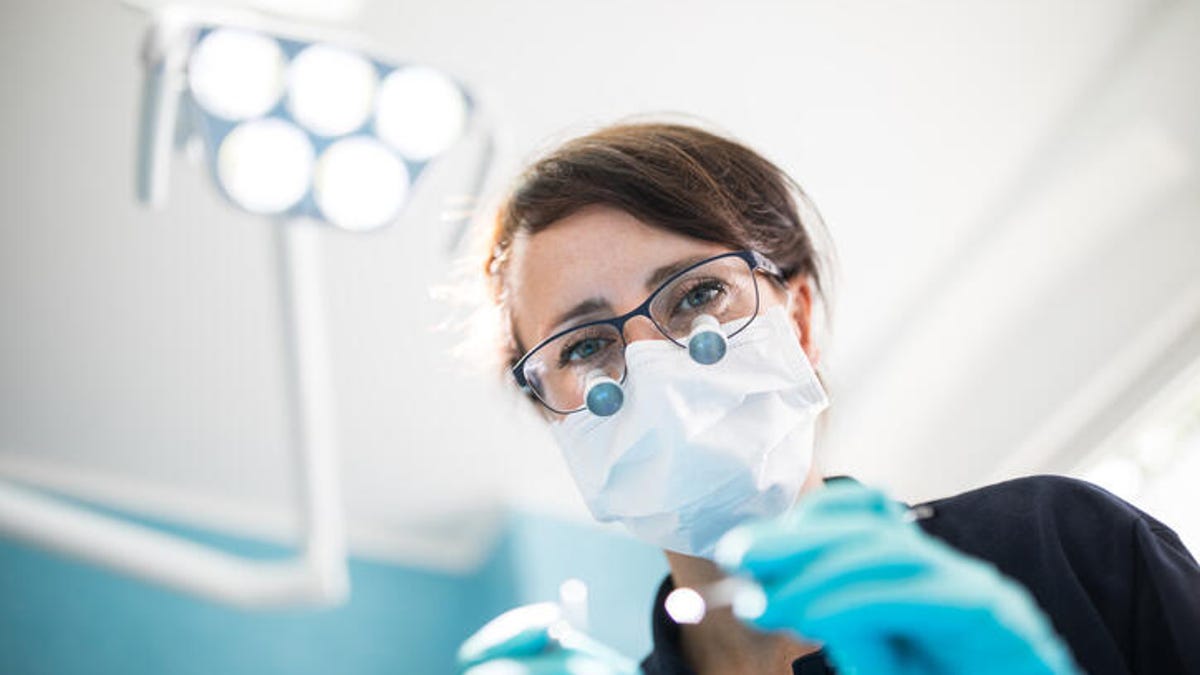Is it safe to go to the dentist right now? What to know before you go
The World Health Organization says you should postpone routine visits, but many dentists disagree.

Deciding if you should go to the dentist now is a personal choice -- here's what the WHO and the ADA have to say.
If you've never been a fan of going to the dentist, then you may have an excuse to skip your routine visit this year -- depending on your views about COVID-19 safety. Dental cleanings and check-ups are important to keep your mouth healthy and avoid costly procedures, like a root canal, down the line. But because of the coronavirus pandemic, there is conflicting guidance out there about whether or not you should still go to the dentist for non-emergency appointments.
The WHO released a statement in August recommending that people skip routine dental check ups and cleaning during the COVID-19 pandemic. It said you should only visit the dentist for necessary procedures, including if you have pain, an infection or need emergency attention. In the meantime, the WHO recommends using "remote consultations" if you're not sure if you should see a dentist or not.
In response, the American Dental Association released a statement saying it "strongly" disagrees with the WHO's advice on dental care and that going to the dentist is essential. "Dentistry is essential health care because of its role in evaluating, diagnosing, preventing or treating oral diseases, which can affect systemic health," ADA president Dr. Chad P. Gehani, DDS said in the statement.
Although you should talk to your own dentist before making any swift decisions, safety concerns around visiting the dentist are not clear-cut this year. I talked to an orthodontist to get more information on navigating this complicated (and personal) decision.
Why going to the dentist may be risky
"The relative safety of visiting the dentist right now is very state and individual-specific. For those states with surging numbers of cases of COVID-19, I would advise to see your dentist only in the case of emergency (severe pain or infection)," Dr. Heather Kunen, DDS, MS and cofounder of Beam Street said.
According to the WHO report, the nature of oral health visits creates a risk of contracting the coronavirus for both patients and health care workers, because of the ways experts believe the virus is transmitted. First, there's evidence that respiratory droplets produced by coughing, sneezing and talking spread the virus. Because they are working in your mouth and are in close contact with you (far closer than 6 feet), your dental provider will be exposed to those droplets -- along with blood and saliva.
Second, the WHO suggests that the coronavirus can be spread through aerosol transmission. Many common dental procedures, such as a teeth cleaning, generate aerosols, which puts the workers at risk of contracting the virus.
It's important to talk to your dentist before you make any decisions about oral health care.
In addition to the risks for both patients and workers listed above, you have to keep in mind that you won't be able to wear a mask during a dental care visit, making you vulnerable to germs from other people around you, and allowing you to spread germs as well. Because its possible to be infected with the coronavirus and not show symptoms, you could unknowingly spread it at your next dental appointment or contract it from an asymptomatic provider.
In contrast, going to a general doctor's appointment likely poses a lower safety risk because both the doctor and patient can distance as much as possible and wear masks for most procedures.
Dental workers have been using personal protective equipment, such as gloves, masks and face shields for decades now, but according to the FDA, PPE cannot completely eliminate the risk of transmitting a virus. "For those states whose cases have leveled off, the conditions may be safer for emergency and/or routine appointments, though proper PPE precautions should still be taken," Dr. Kunen says.
If you're considered high risk (like if you have pre-existing medical conditions or are over 65) or are immunocompromised, you may want to hold off on your routine visits, no matter what the virus conditions are like in your community. "Those high-risk patients should only go to the dentist if they are experiencing pain or infection. Overall I would advise each patient to call his or her provider for the best guidance for office visits," Dr. Kunen says.
What dentist offices are doing to keep patients safe
Many dentist offices are increasing safety measures to help keep patients and workers safe.
"At my office, we have installed new air filtration systems, put extra barriers between dental chairs, implemented increased PPE, and limited the amount of patients who can be at the office at one time," Dr. Kunen says.
If you do visit the dentist, you'll likely have to answer questions about your health and if you've been in contact with anyone who may have the virus before your appointment. Temperature checks are also common.
Whether or not you should go to the dentist is ultimately a personal decision. Knowing the potential risks, you should consider your own level of comfort with the circumstances and do what feels best for you and your situation.
"We are still in the very early stages of understanding this mysterious virus, and I think it's impossible to properly gauge the safety of entering populated areas," Dr. Kunen says. "I advise those patients who are still very concerned about contracting the virus to wait until conditions improve or until we have a better understanding of COVID-19."

